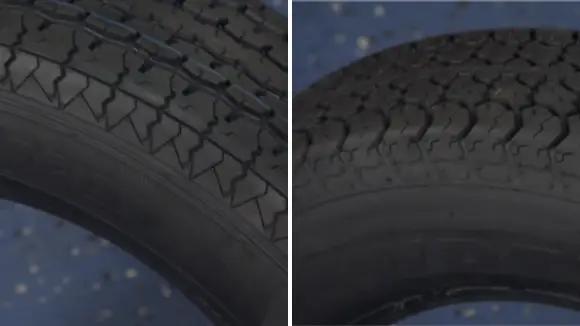Last Updated on September 25, 2023
Are you ready to hit the road and tow your precious cargo? Well, before you embark on your journey, it’s crucial to understand the importance of choosing the right trailer tires. Regarding trailer tires, the debate often revolves around 4 ply vs 6 ply options.
4-ply trailer tires are generally lighter and more flexible, offering a smoother ride and improved fuel efficiency. On the other hand, 6-ply trailer tires are sturdier and more durable, making them suitable for heavier loads and rougher terrains. They provide better resistance to punctures and increased load-carrying capacity.
Here, we’ll discuss the key differences between 4 ply and 6 ply trailer tires. Also, we will discuss some common questions about the two types of trailer tires and which one is best for different scenarios.
Differences between 4 Ply vs 6 Ply Trailer Tires

When considering the differences between 4 ply and 6 ply trailer tires, there are several key points to keep in mind.
- No 01: Load Capacity Variations
- No 02: Tire Weight and Compatibility with Rims
- No 03: Durability and Longevity
- No 04: Handling and Ride Quality
- No 05: Tire Size Considerations
- No 06: Inflation Pressure Impact
- No 07: Vehicle Weight Distribution
- No 08: Sidewall Strength and Safety
- No 09: Rolling Resistance
- No 10: Fuel Efficiency
No 01: Load Capacity Variations
If you go with 6 ply trailer tires instead of 4 ply tires, you’ll notice significant variations in their load capacity. The ply rating of a tire refers to the number of layers of fabric or cords used in its construction, and it directly affects the tire’s ability to handle heavy loads. A higher ply rating means a stronger tire that can withstand greater weight.
In the case of 6 ply trailer tires, their load capacity is typically higher compared to 4 ply tires. This means that they can carry heavier loads without compromising safety or performance. The increased load capacity of 6 ply tires is particularly beneficial for trailers that haul heavy loads or are used for commercial purposes.
4 ply trailer tires are usually used in residential settings, where lighter loads and less frequent use are the norm. They are cheaper than 6 ply tires, making them an attractive option for recreational trailers.
No 02: Tire Weight and Compatibility with Rims
4-ply tires are typically lighter in weight than 6-ply tires. This can be advantageous for trailers that need to be maneuverable or for smaller vehicles that require lighter loads.
However, it is important to note that the weight of a tire also affects its compatibility with rims. While 4-ply tires may be lighter in weight, they may not be suitable for all rims.
Some rims may be designed specifically for use with 6-ply tires, and attempting to use a 4-ply tire on such a rim could result in compatibility issues, reduced performance, or even safety risks. Therefore, trailer owners should always consult the manufacturer’s recommendations when selecting tires and rims.
No 03: Durability and Longevity
A vehicle’s tires should be durable and long-lasting, as they can greatly affect your vehicle’s performance and lifespan. Regarding 4 ply and 6 ply trailer tires, durability and longevity are key considerations.
Ply is the number of layers of fabric or rubber used in the tire construction. 6 ply indicates a tire with six layers and 4 ply indicates a tire with four layers.
Generally, 6 ply trailer tires are more durable and long-lasting than their lower ply counterparts. The additional layers provide extra strength and resistance to punctures and damage, making them ideal for heavy loads and rough terrains.
Investing in 6 ply trailer tires ensures that your tires can withstand the demands of towing and provide reliable and safe performance for an extended period.
No 04: Handling and Ride Quality
When comparing 4 ply and 6 ply trailer tires, you must consider the impact on handling and ride quality. 4 ply tires, also known as bias ply tires, are constructed with multiple layers of rubber and fabric cords running diagonally across the tire. This design provides a stiffer sidewall, resulting in better stability and improved handling.
However, some trailer owners may notice decreased stability and bumpier ride when compared to heavier 6-ply tires.
On the other hand, 6 ply trailer tires, also known as radial tires, have steel belts running across the tire, which allows for a more flexible sidewall. This flexibility provides a smoother ride, absorbing bumps and vibrations on the road.
No 05: Tire Size Considerations
The size of the tire affects various aspects of the trailer’s performance, including its handling and ride quality. A larger tire size, such as a 6 ply tire, generally offers better stability and load-carrying capacity compared to a ply tire. It can provide enhanced traction and control, especially when towing heavy loads.
4 ply tire size is popular for lighter loads, as it offers a smoother ride and is easier to maneuver. Smaller tires also tend to be more affordable than their 6 ply counterparts.
No 06: Inflation Pressure Impact
With regards to 4-ply vs. 6-ply tires, inflation pressure can affect both options. While 6-ply tires have a higher load capacity than 4-ply tires, they may also require higher inflation pressure to support the weight of your trailer. However, overinflating your 4-ply tires may help compensate for their lower load capacity.
No 07: Vehicle Weight Distribution

To ensure a smooth and stable towing experience, make sure your vehicle weight is evenly distributed among all four wheels. 6-ply tires are generally recommended for heavier loads and vehicles with unbalanced weight distribution, providing increased durability and load capacity.
However, 4-ply tires may be suitable for lighter loads and properly balanced weight distribution.
Here are some key factors to consider about vehicle weight distribution:
- Load distribution: Make sure your cargo’s weight is properly distributed within the trailer. Avoid placing all the weight at the front or rear, as this can cause imbalance and affect the trailer’s stability.
- Tongue weight: The tongue weight, or the downward force exerted on the hitch by the trailer, should be around 10-15% of the total trailer weight. This helps maintain proper balance and control during towing.
- Tire capacity: Check the load capacity of your tires and ensure that it is sufficient to handle the weight of your vehicle and trailer. Overloading the tires can lead to tire failure and compromise safety.
- Suspension system: Consider upgrading your vehicle’s suspension system to handle the additional weight of towing. This can improve stability, control, and overall towing performance.
A properly distributed load can greatly impact the performance and safety of your trailer. Uneven weight distribution can cause excessive wear and tear on tires, leading to blowouts or even accidents.
No 08: Sidewall Strength and Safety
Ensure your vehicle’s sidewall strength is sufficient to handle the weight and stress of towing, as a study found that sidewall failures are responsible for a significant number of tire blowouts during towing.
The sidewall of a tire plays a crucial role in maintaining stability and providing protection against external forces. The sidewall is subjected to increased pressure and strain when towing a heavy load.
Additional layers in 6-ply tires provide extra reinforcement, making them more resistant to wear and punctures. This added strength can be critical for heavy-duty hauling and long-term use.
On the other hand, 4-ply tires may be sufficient for lighter trailers or occasional use, but they may need to be more reliable in high-stress situations. It’s important to note that sidewall strength is just one factor in overall tire safety.
No 09: Rolling Resistance
Considering 4 ply and 6 ply trailer tires, it’s important to consider rolling resistance. Rolling resistance refers to the force required to keep the tires rolling as your vehicle moves. Tires with high rolling resistance require more energy from your engine, leading to increased fuel consumption.
On the other hand, tires with low rolling resistance reduce the energy needed to keep your vehicle in motion, resulting in improved fuel efficiency.
While 4 and 6 ply tires can provide adequate sidewall strength and safety, 4 ply trailer tires tend to have lower rolling resistance due to their construction and materials.
No 10: Fuel Efficiency
When comparing 4 ply and 6 ply trailer tires, fuel efficiency is an important factor to consider. Generally, 4 ply tires are lighter in weight and require less energy to rotate, which can result in better fuel efficiency.
However, the difference in fuel efficiency between a 4 ply and 6 ply tire may be negligible for some towing situations. Factors such as driving habits and vehicle aerodynamics can also impact fuel efficiency.
What Are the Key Differences Between 4 Ply and 6 Ply Trailer Tires in Terms of Performance?
When comparing 4 ply vs 12 trailer tires: essential comparisons, the key differences in performance become apparent. 6 ply trailer tires offer greater durability, making them ideal for heavier loads and rough terrains. On the other hand, 4 ply tires are lighter, providing improved fuel efficiency. Understanding the specific needs of your trailer will help determine the most suitable option for optimal performance.
Are 4 ply trailer tires better than 6 ply?
While 4 ply tires may be suitable for light cars and flat surfaces, they aren’t designed for heavy-duty tasks. Manufacturers specifically indicate that 4 ply tires aren’t appropriate for heavy carriage or towing.
In terms of strength and construction, 4 ply trailer tires differ from 6 ply trailer tires. 6 ply trailer tires offer superior strength and durability compared to 4 ply tires. Their increased strength makes them better equipped to handle heavy-duty tasks like carrying heavier loads.
The additional layers of fabric or rubber in 6 ply tires provide added support, reducing the risk of tire failure or blowouts.
Is a 4 ply tire good for towing?

Ensure a safe and worry-free towing experience with the right tire strength for the job. In towing, the strength of your trailer tires is crucial. A 4-ply tire can certainly handle the load, but it may not provide the level of durability and sidewall strength that a 6-ply tire can offer.
To better understand why a 4-ply tire may not be the best choice for towing, consider the following factors:
- Sidewall strength: A 4-ply tire may not have the same level of sidewall strength as a 6-ply tire. This means that when the load is applied, the sidewalls of the tire may not be able to withstand the pressure, leading to a potential blowout.
- Load capacity: A 4-ply tire may have a lower load capacity than a 6-ply tire. This means it may not be able to handle heavier loads, which can strain the tire and increase the risk of failure.
- Durability: A 4-ply tire may not be as durable as a 6-ply tire. This means that it may wear out more quickly, especially when subjected to towing demands.
4 Ply or 6 Ply Trailer Tires: Which One Should You Choose?
After delving into the differences between 4 ply and 6 ply trailer tires, it’s clear that both options have their merits.
While some may argue that 4 ply tires are better for towing due to their flexibility and lighter weight, others swear by the sturdiness and durability of 6 ply tires. But experts say 6 ply is better as it can handle more load capacity and is more resistant to potential blowouts.
Ultimately, the choice depends on your specific needs and preferences. Remember, whether you opt for 4 ply or 6 ply, both will provide reliable support on your towing adventures.



